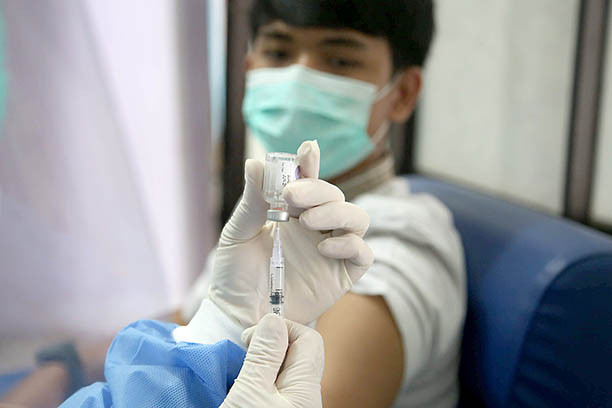Popular Reads
Top Results
Can't find what you're looking for?
View all search resultsPopular Reads
Top Results
Can't find what you're looking for?
View all search results‘Long road’ to herd immunity
Experts insist immunity impossible to achieve in 15 months
Change text size
Gift Premium Articles
to Anyone
T
he government has high hopes for achieving herd immunity against COVID-19 through its ambitious vaccination plan, but experts say it might take years and wider inoculation coverage for that to happen, especially without sufficient containment efforts.
Indonesia began its vaccination program on Wednesday using Chinese firm Sinovac Biotech’s CoronaVac vaccine, which would be used on the largest share — some 65 million — of the targeted 181.5 million Indonesians.
The country has received 3 million ready-to-use doses of the vaccine and 15 million bulk doses and expects to receive another 107 million bulk doses produced by state-owned pharmaceutical firm Bio Farma gradually until next year.
But how well the vaccine will help the country’s fight against COVID-19 has led to concerns over piecemeal information on the vaccine’s efficacy in trial settings.
Brazil has said the vaccine was 50.4 percent effective based on final interim data, down from 78 percent announced days prior. The figure is just slightly over the World Health Organization’s minimum rate of 50 percent to be eligible for emergency use.
In Indonesia, interim data showed a 65.3 percent efficacy rate, although spokespersons from both Bio Farma as Sinovac’s partner in Indonesia and the Food and Drug Monitoring Agency (BPOM) did not disclose more detailed data upon request from The Jakarta Post. Turkish officials, meanwhile, reported 91.25 percent efficacy.
Read also: Indonesia allows emergency use of Sinovac vaccine
But irrespective of the vaccine and its effi cacy, achieving herd immunity in 15 months — as targeted by President Joko “Jokowi” Widodo — is impossible, according to experts.
Dicky Budiman, a global health researcher at Griffith University, said achieving herd immunity would be a “long road” of three to four years.
Dicky said that current efficacy data only suggested the vaccine’s ability to prevent infection and severity of symptoms rather than its efficacy against infectiousness — or whether people vaccinated would be able to still transmit the virus to others. The latter was best used to determine the vaccination coverage needed to reach herd immunity, he said, but it would not be immediately known for months.
“The formula to reach herd immunity is simple, but in practice, it isn’t as simple. The variables — efficacy against infectiousness, reproduction number and vaccination coverage — are dynamic,” he said.
Reproduction number, or how many people a given patient is likely to infect, indicates how infectious the disease could be, with a rate of below one suggesting a contained outbreak.
If, for example, the efficacy against infectiousness turns out to be around 60 percent with a reproduction number of two, Dicky said Indonesia would have to inoculate around 83 percent of its total population rather than the total targeted population aged above 18 years old, as currently used by the Health Ministry. The 181.5 million people represent around 67 percent of the country’s total population
Read also: More Sinovac vaccine arrives in Indonesia ahead of vaccination drive
“It will take some to reach herd immunity,” said University of Indonesia professor and immunologist Iris Rengganis, who estimated that it would take around three years.
She added that one issue was how long the vaccine’s effects would last, which was still being studied. A shorter protection period meant it would take longer for Indonesia to reach herd immunity as reinjection or boosters might be necessary. The vaccine's effectiveness would only be known after the rollout, she said, adding that a rate lower than efficacy rate should not come as a surprise.
“The optimistic assumption is protection will last two years after the second shot, and the pessimistic assumption is six months," Dicky said. "If the protection is that short, we'll be racing against the virus because the vaccination rollout must move faster while coverage must meet the requirement to achieve herd immunity."
But even without herd immunity in sight, experts agreed that vaccinating people now was necessary to protect at-risk groups, such as medical workers and essential workers, to ease the burden of the country's currently overwhelmed healthcare system.
Read also: Hospital beds remain scarce as Indonesia rolls out vaccines
As the country enters its earliest stages of the vaccination program, experts have warned against complacency as much was left to be known about currently developed vaccines and also the virus itself.
Dicky said that other than the vaccine's ability to reduce transmission, reaching herd immunity would also depend largely on how well an outbreak was contained or how low the reproduction number could be reduced through enhanced testing, tracing and isolation, as well as mask-wearing and mobility restrictions.
Despite reimposing curbs across Java and Bali on Monday, the government recently allowed airlines to serve passengers at 100 percent capacity despite the number of cases and deaths soaring above 11,000 and 300 a day, respectively.










